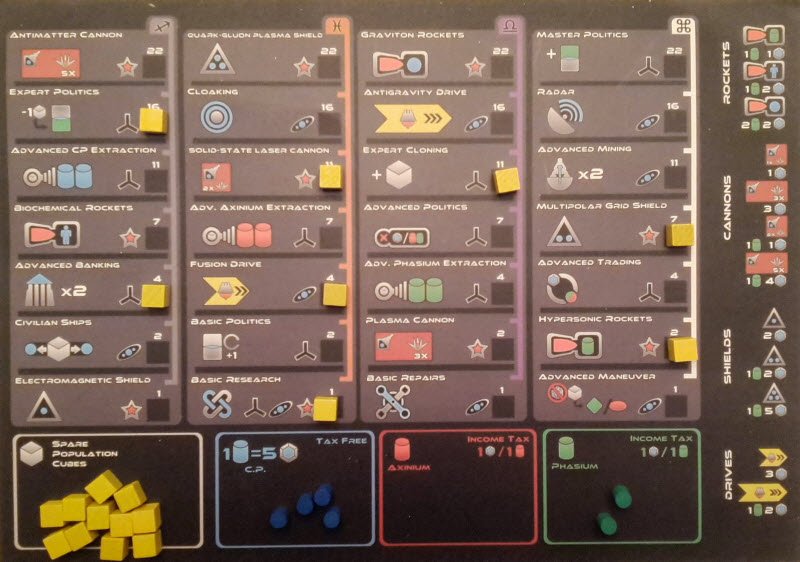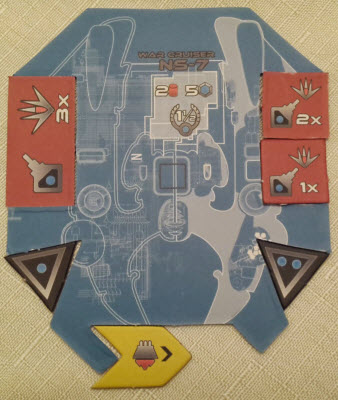Note: This review pertains to the First Edition of Exodus: Proxima Centauri
Humans are a conflicted and confounding species. For all of our progress, we continue to struggle with an inner duality like no other known species. We painted the Sistine Chapel; we have written epic symphonies and prodigious novels. Innovation took us from simple nomads to the frontier of outer space. Technology compressed our collective knowledge into a device that fits in a single room. We discovered new elements, created vaccines to pandemic plagues, and cracked our own genetic code. And we did all it in a very, very short period of time.
If only all of our efforts went into such pursuits. For humans are also capable of unspeakable brutality and savagery. We perennially fell victim to the calls of power, greed, and lust. We specialized in weapons that served no other purpose but kill other humans, torture other humans, enslave other humans. Yet we still had the conceited superiority that we were better than other animals, and that the natural world did our bidding without having any real impact.
Except, that’s what happened. We let our baser attributes get the better of us, and we ruined Earth. So we paused our ambitions to eradicate one another and took to the stars in search of a new home. Eventually, we found one. And then we started up again right where we left off…
The Premise
Six warring factions of humanity led a mass exodus from Earth, and just when it seemed all was hopeless, the convoy was rescued by a benevolent alien race. They propped humans back up and assisted in resettling them on new planets. Only the fear of alien retaliation kept humans from once more attacking each other. However, the aliens are now leaving, and hostilities have resumed.
The Rules
Exodus: Proxima Centauri is a Big Box Game and requires ample room. The rule book also details the starting map layout, depending on the number of players. Every map contains a player’s home world and planets which generate one the game’s three resources: Crystallized Platinum (CP), Axinium, and Phasium. CP is used as the game’s main currency, whereas Axinium and Phasium are used to build and upgrade ships, respectively.
To begin, each player receives a player board, as well as a complete set of tokens, ships, population cubes, dice, and Action cards, as well as a few starting resources. Turn order is initially either assigned or determined randomly.
Exodus is played over seven rounds, with each round broken down into five phases: Upkeep, Council, Action, WMD, and Conquest. Upkeep consists of resetting the marketplace, adding population cubes home worlds, and collecting resources.
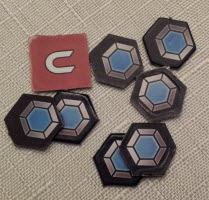
An early-game vote for card C.
In the Council phase, players vote on Political cards and turn order. This is done by bidding CP. Three Political cards are revealed, and players secretly bid on one. The card with the most backing takes effect. Next, the current first player (the Chancellor) and second player (Vice Chancellor) decide on a Bonus Action for the round, if any. Lastly, players once more secretly bid CP on a new turn order.
In the Action phase, players select from one of six Action cards:
- Banking: Roll a six-sided die and collect that much CP.
- Buy Ships: Purchase ships for use. There are four kinds of ships, and players are limited to two of each kind. Each ship’s capabilities are dependent on is blueprints.
- Buy Upgrades: Purchase ship upgrades (engines, weapons, and shields) and / or purchasing rockets. However, a player must have the requisite research to purchase them.
- Mining: Roll a six-sided die and put up to that many resource units from the supply on to planets they have population.
- Research: Select one technology for research and pay its CP cost. The cost is reduced by each other researched technology in its column as well for each other technology of the same kind.
- Trade: Roll a six-sided die. The player may conduct that many transactions at the marketplace.

The Banking Action card, with Research secondary.
Action cards contain a top and bottom action. Players choose an Action card reveal the top action of each simultaneously. Then, players may optionally execute the bottom action of any card, though using another player’s card is more costly.
Once all Actions are resolved, players select a second card from their hand and repeat the process. After the second round of Actions, if there is a Bonus Action, players resolve that as well.
In the WMD phase, players fire rockets at non-homeworld planets. For each rocket, a pair of dice rolls determine the outcome. All rocket launches happen simultaneously. Damage from a WMD consists of either destroying resources on a planet, destroying population on a planet, or destroying the planet itself.
Lastly, in the Conquest phase, players move ships to transport populations and engage in combat. Movement happens simultaneously by secretly assigning movement vector chips and then revealing them.
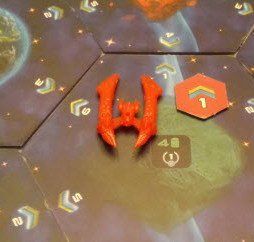
Red’s ship is moving north.
After movement, if any tile is contested between players or the neutral alien forces, combat ensues. Combat and retreat are not optional; players fight until only one side remains. Combat is controlled by a series of dice Success / Fail dice rolls, and all ships fire concurrently.
After all combat is resolved, players repeat the Conquest phase a second time before ending the round.
Victory in Exodus is determined by collecting VP. VP is acquired during the game by destroying enemy ships, but most VP is attained at the end of the game for things such as controlling planets, controlling the center tile, being Chancellor / Vice Chancellor, and having a spread-out fleet. The player with the most VP is declared the new ruler of the Human Empire.
Everyone else’s leader will likely meet a convenient but unfortunate end.
A Model [Solar] System
From the onset, Exodus: Proxima Centauri clearly wants to make a name for itself among the 4X Game world. 4X games are known to be lengthy, complicated affairs, and they require a bit of stamina. Moreover, the rules are often hefty, if not cumbersome. The trick to a successful 4X game is to be robust and complex enough to justify the commitment, while still being accessible and entertaining.

Our childhood lessons are finally paying off.
Exodus approaches this by offering reduced player downtime. Proxima Centauri’s does this by having players resolving as many things as possible simultaneously. From moving units, to firing Rockets, to the entire Upkeep phase, Exodus has a streamline gameplay. This alleviates the issue that can happen with large games, where if it isn’t your turn, what’s happening is often irrelevant to you.
This approach has three immediate benefits. First, it reduces the game’s play time. (Even still, 4X games are still lengthy. They are the polar opposite of what a Socializer desires in a game.) Second, it consolidates the rules of the game, making it easier to follow and reducing the learning curve. Indeed, one of the impressive things about Exodus is its relative ease to learn for a 4X game. Lastly, it has the benefit of making some logical sense. All movement and firing happens at the same time instead of one side firing, assessing the situation, and then retaliating? Yes please. It’s a minor aspect, but one that’s appreciated all the same.
The Search For Identity
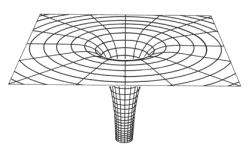
Black hole diagram, or path to victory chart?
That being said, there are also areas where Exodus doesn’t make sense. The game strives to encompass all of the elements you’d expect in a typical 4X game. However, the execution is a bit more muted. None of this is more evident than the game’s win mechanic.
Instead of rewarding you for diversifying your strategy, Exodus, intentionally or not, forces players down a linear path. The primary ways to get VP are to either destroy other ships or to control lots of territory at the end of the game. In isolation, this is not an issue, as warfare is expected. For the subset of Strikers who don’t mind a long game commitment, they will enjoy themselves with Exodus as a result.
The issue, rather, is that all of the other major pillars of the game just become a means to that end. There is no victory condition for high levels of technology, for example, but tech research is still required. This is unfortunate, as the technology tree is remarkably well designed to allow for a variety of play styles. Similarly, exploiting the marketplace or controlling the political arena helps you in the short term, but there is no VP reward for capitalizing on them. All of the pieces are there for more political or mercantile victory options – except for the execution. This essentially leaves many of the complicated aspects of a 4X game intact, but it takes away a lot of the game’s strategic depth. These areas feel underutilized, as if they are nothing more than a complex series of hoops to jump through merely to upgrade your ships.
For someone seeking a path to victory beyond direct player vs player combat, it’s a bit disappointing. This will rightfully give Tacticians pause, although there is still enough variety to keep their machinations satiated. However, the same cannot be said of Architects. This group generally gravitates to expansive games with multiple win conditions like moths to a flame, but they will have a difficult time with this one.
Exodus operates closer to a lumbering Area Control game with a lot of skirmish battles. Yet players are limited to a mere eight ships. While this is actually a positive thing – avoiding the trappings of being bogged down with large fleet battles – it only further illustrates the identity crisis that Exodus seems to have. The only other obvious combat tactic a player has is using rockets. WMDs can be used every round and are uncounterable but for the dice roll, making them quite (if not overly) powerful. Granted, the unpredictability of rocket use alone is likely enough to entice most Daredevils, but generally rockets either have everyone scrambling for their own, or no one purchases them.
A Near-Miss
Unfortunately, identity is not the only mixed area with Exodus: Proxima Centauri. The components are one such example. On the one hand, the ship pieces are decent, and the physical customization of your ships via blueprint boards is one of the game’s most appealing mechanics. On the other hand, not all pieces are created equal. Literally. The ship parts don’t always actually fit into the boards. Indeed, the thin player boards and non-uniformly-cut chits makes Exodus feel slightly lackluster for game of its magnitude.
The same can be said about the game’s theme. Exodus’s rule book has a nice story narrative, but it’s not conveyed well in-game. None of the planets are named – not even the home worlds – and the six factions have lack identity beyond color. Even the mysterious Centaurian race has little to show of its alien-ness. From a thematic standpoint, Exodus is the equivalent to a generic sci-fi template, and there will be little for Immersionists to latch on to.

Exodus also has a head-scratching half VP count…
Then there is the issue of randomness.
Rolling dice to determine the outcome of something in a game is not inherently a bad thing. The combat system in Exodus, for instance, is a perfect illustration of the mechanic working well. The problem is that there are also dice rolls for practically everything else. Three of the six Action cards are directly tied to rolling dice, and rockets require not one but two different rolls. In Exodus, a series of bad dice rolls could not only lose you ships, but it could even prevent you from being able to rebuild. Even when you research the technologies to mitigate the luck side of it, continually rolling dice for mundane actions still generates a tedium effect over a prolonged period of time.
The Takeaway
If Exodus: Proxima Centauri were summed up in one word, it would be ‘uneven’. It bears all of the trademark signs of an ideal big box game, full of markets, politics, arms races, and warfare. Once the basics of Exodus are fully explained, it’s remarkably straightforward for something with so many moving pieces, and it doesn’t sacrifice complexity to accomplish this. But the game also tends to be very fiddly, and by handcuffing many non-combat aspects of the game, it marginalizes their usefulness. It presents a game of grand scale in a respectable time frame by minimizing downtime, and it keeps everyone actively engaged. But then it turns around and requires dice rolls for half of the basic actions in the game. It wants to convey an epic story, but so many visuals components appear generic and interchangeable. And so on.
Exodus: Proxima Cenatauri falls a few rungs short on the ladder it clearly set for itself. Exodus is a decent game that has the potential to be greater, but it still is a worthwhile option in the 4X pantheon. It just can get in its own way at times.
Exodus: Proxima Centauri is a product of NSKN Games.
Cardboard Republic Snapshot Scoring (Based on scale of 5):
Artwork: 2.5
Rules Clarity: 3
Replay Value: 2.5
Physical Quality: 2.5
Overall Score: 2.5
Photo Credits: Diego picture by Paramount Pictures; Black Hole diagram by Astronomical Society of the Pacific.

